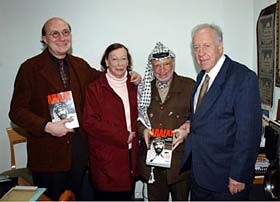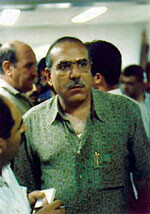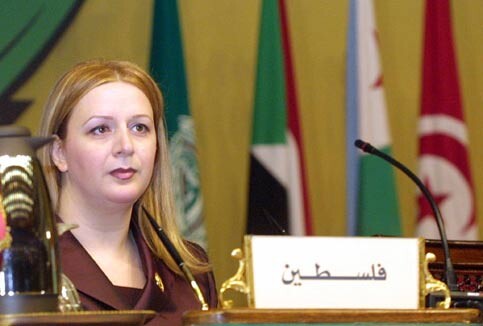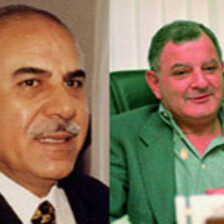The Electronic Intifada 18 February 2004

Arafat meeting the author and publisher of a French-language book, Arafat the Invincible, 17 February 2004.
Israel seems to be comfortable with a totally ineffective PA which is still officially responsible for the burdensome costs of the occupation. This situation has enabled Israel to blame the Authority, rather than the occupation for daily Palestinian suffering, and for the ever deteriorating security situation.
The purpose of the frequent Israeli leaks that the PA is about to collapse seems to be to disguise this reality. The PA has been reduced from a national liberation movement and state-building entity to nothing more than a security agent and scapegoat for the occupier. The PA should not allow this situation to continue, but it shows no sign that it is capable or willing to change.
That Israel can conduct daily raids and killings, demolish homes, arrest citizens, impose closures, destroy trees and farmland, and build colonies and walls unimpeded exposes the utter failure of the PA to offer even minimal protection to its people, or at least stand aside and allow them to defend themselves.
In fact, the PA does not dare raise a finger in the face of Israeli aggression; it limits itself to harmless protests that whatever atrocity Israel has committed harms the non-existent “peace process.” Having repeatedly renounced violence and condemned it when used by other Palestinians, the PA has also delegitimized and undermined the basic right to self-defence that is recognized in every legal system on earth.
Already on the defensive politically, the PA’s position has been further eroded externally, particularly as a result of its inability to meet an undertaking to dismantle “terrorist” groups including Hamas, Islamic Jihad and the military wing of Fatah.
With so little room for action on the home front, PA Prime Minister Ahmed Qureia recently embarked on a tour of Arab and European capitals. Apart from travel for its own sake, as a pleasant alternative to the stagnation and political bankruptcy at home, Qureia might have been motivated by two slim hopes. First, he may have sought to alleviate a severe financial crisis by holding out the hat to European and Arab donors. Second, he was lobbying for help to resuscitate the comatose peace process. Qureia surely recognizes that, under present conditions, resumption of a peace process cannot lead to peace. Rather, the appearance of a peace process is enough to temporarily restore to the PA its raison d’etre.
Qureia’s mission met with little tangible success, although he did gain some symbolic verbal condemnations of Sharon’s apartheid wall. Otherwise he heard the usual American and Israeli-inspired refrain that the Palestinians “must do more” to dismantle “terrorist” organizations and curb violence. He was also advised to finally hold his much-postponed meeting with Sharon, something that would do neither him nor the Palestinian people any good.
Meanwhile, the PA was further undermined by the eruption of new corruption scandals, involving Qureia and other key leaders.
While the Prime Minister was complaining to European leaders about the Israeli Wall and its devastating effect on Palestinians, the Associated Press (AP) reported that a cement company owned by Qureia’s family and based in his home town of Abu Dis, was selling cement to Israeli settlements and for the construction of the very same wall. In an 11 February report, the AP cited Israel’s Channel Ten TV showing cement mixers leaving Qureia’s “Al Quds” cement company and heading towards the nearby Israeli settlement of Ma’ale Adumim. The TV report also said that Qureia was supplying cement to build concrete slabs for the Israeli barrier right outside his Abu Dis home.
A Palestinian lawmaker quoted by the AP as said “there was evidence that Qureia was selling cement to Ma’ale Adumim,” and that his suspicion was strengthened by the fact that Qureia had transferred ownership of the company to another member of his family just a few months ago.

Jamil Tarifi (Nigel Parry)
If these allegations were not shocking enough, France announced that it is investigating money transfers totalling 9 million euros ($11.5 million) from Swiss banks to private accounts owned by Suha Arafat, the wife of the Palestinian leader. The French concern over possible money laundering may not be the most disturbing aspect of the affair.
What remains to be explained is why the Palestinian First Lady is living in Paris in the first place instead of remaining with her people and sharing their plight. She was happy enough to be in the Occupied Territories when Hilary Clinton and other dignitaries would come to pay their respects. And where did this money come from if it is not money that rightfully belongs to the Palestinian people? And why should such an enormous sum be allocated to one small Palestinian family — Mrs. Arafat and her daughter — if not to sustain a lavish Parisian lifestyle? The same amount of money could support almost 6,000 Palestinian families for an entire year, given that many survive on no more than $6 per day.

Suha Arafat (Marwan Naamani/AFP)
Suha Arafat has indeed addressed some of these questions, although she seems to have missed the point entirely. Quoted in Al Hayat newspaper on 12 February, Suha asked, “What is so strange for the Palestinian president to send any amount of money to his family and his wife who is protecting the Palestinian interests abroad, and the money came and will come legally?”
What seems normal to Mrs. Arafat is shocking to ordinary Palestinians. Can their leaders really think they are so stupid? And can anyone point to any valuable services Suha Arafat has performed on behalf of her people? Had the bank transfers not been revealed, no one would have known anything about her.
Yet neither Qureia’s nor Mrs. Arafat’s denials will do much to clear the thickening clouds of suspicion and mistrust that hang over the PA. Neither does the ongoing parliamentary investigation offer much hope, in the light of earlier experience.
Over six years ago, a similar Palestinian parliamentary panel conducted an investigation of the PA corruption. The nine-member panel of the Palestinian Legislative Council had, at the time, acted upon the Palestinian State Controller’s report that found that nearly half of the authority’s $326 million 1997 budget had been lost through corruption or financial mismanagement.

Nabil Shaath
Six years later, Tarifi is still in the cabinet, and the subject of a renewed investigation. Shaath has been in the cabinet continuously and advanced to ever higher positions. An administration which loudly brags that it has been democratically elected (almost ten years ago) should be able to observe the simplest principles of democracy: when you fail you leave. The good thing about democracy is that it grants the people the right to evaluate the performance of the leaders they elect and to vote them out of office once proved incompetent.
The PA, which has only been reaping failures, indulging in opportunism and corruption, dedicating all its effort to its own survival at any a cost, even at the expense of the rights of its people, is neither leaving voluntarily nor is it allowing years-overdue elections to decide its fate. It is high time that, one way or another, this failed leadership should let the beleaguered Palestinians choose new leaders.
The writer is a former Permanent Representative of Jordan at the UN and former ambassador. He contributed this article to The Electronic Intifada.



